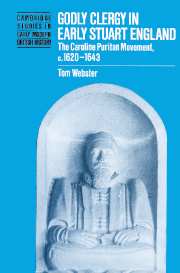Book contents
- Frontmatter
- Contents
- Acknowledgments
- List of abbreviations
- Introduction
- Part I Society, clerical conference and the Church of England
- Part II The godly ministry: piety and practice
- Part III ‘These uncomfortable times’: conformity and the godly ministers 1628–1638
- Part IV ‘These Dangerous Times’: the Puritan Diaspora 1631–1643
- 13 John Dury and the godly ministers
- 14 Choices of suffering and flight
- 15 The ‘non-separating Congregationalists’ and early Massachusetts
- 16 Thomas Hooker and the Amesians
- 17 Alternative ecclesiologies to 1643
- 18 Conclusion
- Index
- Cambridge Studies in Early Modern History
18 - Conclusion
Published online by Cambridge University Press: 04 November 2009
- Frontmatter
- Contents
- Acknowledgments
- List of abbreviations
- Introduction
- Part I Society, clerical conference and the Church of England
- Part II The godly ministry: piety and practice
- Part III ‘These uncomfortable times’: conformity and the godly ministers 1628–1638
- Part IV ‘These Dangerous Times’: the Puritan Diaspora 1631–1643
- 13 John Dury and the godly ministers
- 14 Choices of suffering and flight
- 15 The ‘non-separating Congregationalists’ and early Massachusetts
- 16 Thomas Hooker and the Amesians
- 17 Alternative ecclesiologies to 1643
- 18 Conclusion
- Index
- Cambridge Studies in Early Modern History
Summary
It would not be true to say that the details of the final shape of the Puritan diaspora were inherent in the failed agreement subscribed at Edmund Calamy's house, but the main lines of development had been laid down. The Presbyterian alliance was to remain an unstable amalgam, driven forward by the energy and purpose of the Scots, and efforts for brotherly accommodation were to remain part of the programme of the godly ministers and were to continue, one might say, into the era of the ‘Free Churches’. In late 1641, some of the ministers who have been prominent in this account had some of the most active years of their ministry ahead of them, and some of the ministers had much further to travel ideologically, but if the 1630s, the years of persecution, had been divisive, the 1640s, the years of triumph, were to prove decisively so. Moreover, the divisive possibilities of the 1630s were matched by a strenuous effort to maintain the ideal of the godly community, prompted, ironically, by the common enemy of Laudianism. The need, outlined by Arthur Hildersham, that ‘Though we differ in iudgement in these things, yet should we endeavour, that the people may discerne no difference, nor disagreements among us’, that is, to maintain the visible boundary between godly and ungodly, was more intense in a period of perceived persecution and, to some degree, was successfully met. What proved to be a fatal challenge to the boundaries of godly community was the starkly contrasting position of the 1640s. Persecution operated as a unifying influence; an element of freedom and power provided by the 1640s led to the potential divisions becoming actual divisions.
- Type
- Chapter
- Information
- Godly Clergy in Early Stuart EnglandThe Caroline Puritan Movement, c.1620–1643, pp. 333 - 338Publisher: Cambridge University PressPrint publication year: 1997



